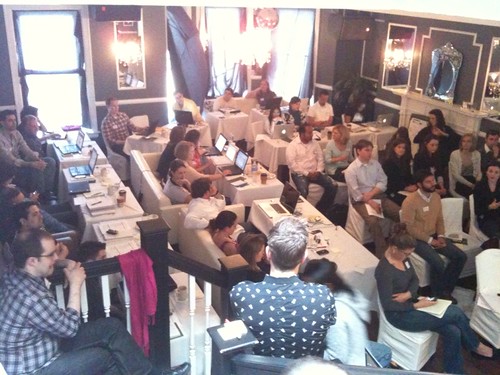 Great things happen. At this weekend's 360 Digital Influence Black Belt Summit in Washington, D.C., 50+ strategists from N. America, the UK and France convened to discuss the latest trends shaping social media marketing and communications.
Great things happen. At this weekend's 360 Digital Influence Black Belt Summit in Washington, D.C., 50+ strategists from N. America, the UK and France convened to discuss the latest trends shaping social media marketing and communications.After two intense days of brainstorming, redstorming and thunderstorming, we all left a bit pooped. Chris Graves, Ogilvy PR global CEO, helped uplift the crowd with a thought piece on influence.
As a social media marketer, I spend day and night thinking about influence. How to inspire a group of consumers to learn about a product? Share a post with a friend? Write a positive review? Conducting business is contingent on the ability to influence potential customers. It's no surprise influence lies at the center of any social media program.
Graves touched on several interesting theories behind influence and human behavior:
1. The Strength of Weak Ties
"Individuals with few weak ties will be deprived of information from distant parts of the social system and will be confined to the provincial news and views of their close friends," (The Strength of Weak Ties: A Network Theory Revisited, by Mark Granovetter; download the full paper to read more).
In other words, while having the ability to influence a group with strong ties (picture Monica, Phoebe, Joey, Chandler, Ross and Rachel) can result in Word of Mouth among the group, only the existence of weak ties will beget viral spread of content.
2. The Impact of Moral Self-Licensing on Green Living and Sustainability
"In the past few decades, consumers have become increasingly attentive to social and ethical considerations in areas such as energy consumption, animal husbandry, and trade,"(Do Green Products Make Us Better People? by Nina Mazar and Cheng-Bo Zhong; full article).
"Building on recent research on behavioral priming and moral regulation, we found that mere exposure to green products and the purchase of such products lead to markedly different behavioral consequences. In line with the halo associated with green consumerism, results showed that people act more altruistically after mere exposure to green products than after mere exposure to conventional products. However, people act less altruistically and are more likely to cheat and steal after purchasing green products than after purchasing conventional products."
3. Six Drivers of Influence
Cialdini's six "weapons" of influence have become a staple for our social media engagement planning. Influence: The Psychology of Persuasion, is currently at the top of my book list!
Thanks to Chris Graves for the inspiring talk and thank you to my fellow strategists for reinvigorating my love for what we do.
No comments:
Post a Comment